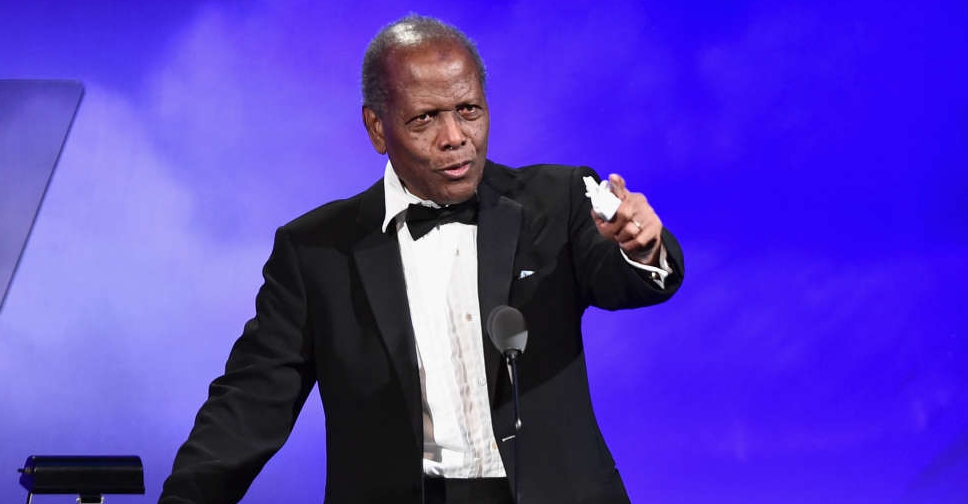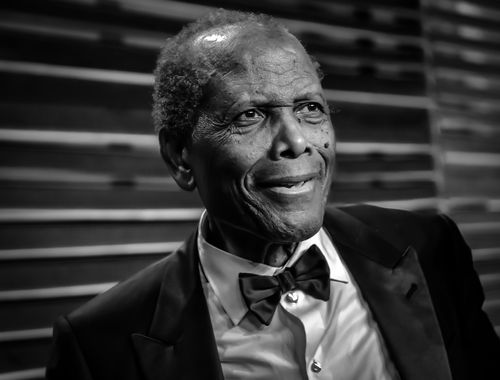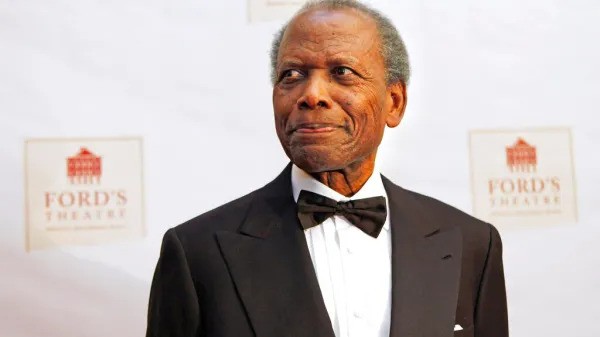I was asked, “Who do you think, if a documentary was made about them, would be the most damning?” If someone made a documentary about people you know, who would it be?
Sydney Poitier? Wait, what? A documentary about the legendary Sydney Poitier would be the most damning in Hollywood? That’s who Jaguar Wright is talking about? Are you serious? Apparently, there’s more to this man than anyone could ever imagine because Sydney Poitier was allegedly the P. Diddy of the ’50s and ’60s. Sydney Poitier encouraged people to buy into the system, while Sam Cooke advocated for breaking the system and creating a new one. Whew, child! I know it might be hard to believe that Sydney was as controversial as Diddy, but what if I told you that there are family members who actually support Jack’s claim that a documentary about Sydney Poitier would be the most damning one in Hollywood?
It appears that several family members have claimed Sydney Poitier distanced himself from his family and acted in ways that led to strained relationships. One commenter said, “I’m a Poitier, and the things I’ve heard about him aren’t good. He abandoned his whole family. He’s my grandfather’s cousin, and he left and never looked back for some reason.” Another person expressed a similar sentiment, stating, “Wow, so we’re related? My grandmother always got angry if you mentioned his name and said the same thing.” Additionally, someone mentioned that they used to do Sydney Poitier’s daughter’s hair in the ’80s and she didn’t have positive things to say about him. Another account suggests that a former girlfriend reported an inappropriate encounter with Sydney at a party, similar to stories about how Diddy has approached women at parties.

Given these allegations, could Jaguar be right in suggesting that a documentary about Sydney Poitier might reveal some troubling truths?
Sydney’s backstory reveals a tale of grit and determination. At the tender age of 12, he abandoned formal education to work as a water boy alongside pick-and-shovel laborers, a decision that left his parents concerned about his future. Seeking a fresh start, they dispatched him to Miami at 14 to reside with his married brother, Cyril. However, Sydney’s adventurous spirit soon led him to New York City, armed with just a few dollars in his pocket. There, he endured a string of menial jobs – washing dishes, digging ditches, and making deliveries – even resorting to sleeping in pay toilets during harsh nights to save money.
Yet, amidst the hardships, Sydney clung to a fervent dream: to tread the boards as an actor. His initial forays into the theater world were met with rejection, his scant education, poor reading skills, and thick accent acting as formidable barriers. Undeterred, he persisted, juggling dishwashing duties with intense efforts to refine his English by mimicking radio announcers and seeking guidance from a sympathetic colleague to improve his reading abilities. His perseverance eventually earned him a coveted spot at the theater’s acting school, albeit after humbly offering to work as a janitor without pay.
Fortune finally smiled upon Sydney when fate intervened during a crucial rehearsal where another actor failed to show up. Seizing the opportunity, Sydney stepped into the spotlight and captivated a Broadway producer, securing a role in the production and launching his journey to stardom.
Since then, Sydney has left an incredible mark on the entertainment world and American culture overall, emerging as the first black actor to achieve major stardom on the big screen. He was widely acclaimed for his portrayals that astutely addressed racial injustices in America, breaking away from the stereotypical representations of black Americans. Sydney’s refusal to perpetuate stereotypes allowed him to embody intelligent and multifaceted characters, providing positive representation for countless viewers. This earned him his first Oscar nomination in 1958 for “The Defiant Ones,” followed by a Best Actor win in 1963 for “Lilies of the Field.” Additionally, in recognition of his groundbreaking career, he was honored with a special Oscar at the 74th Academy Awards in 2002.
Apart from his achievements in the industry, Sydney garnered recognition from world leaders. In 2009, President Obama acknowledged his contributions to American cinema and culture. Queen Elizabeth II bestowed knighthood upon him in 1974, granting him the title Sir Sydney Poitier in the UK. Reverend Dr. Martin Luther King Jr. praised him in 1967, describing him as “a man of great depth, a man of great social concern, a man who is dedicated to human rights and freedom.” Later in life, after returning to the Bahamas, Sydney served as ambassador from 1997 to 2007 and as ambassador to UNESCO, a UN organization.

However, despite his esteemed status, rumors of Sydney’s less-than-virtuous deeds have surfaced, potentially rivaling the notorious reputation of figures like Diddy. According to accounts from Jag, Sydney’s actions may have surpassed even Diddy’s notoriety. While the specifics remain unclear, one notable episode involves Sydney’s affair with Diahann Carroll during the 1960s. Their passionate relationship unfolded during their collaboration on the 1959 film “Porgy and Bess.” At the time, Sydney was married to his first wife, Juanita Hardy, with whom he had four daughters, while Carroll, then 24, was married to music manager Monte Kay.
In her explosive memoir from 2008, titled “The Legs Are the Last to Go,” Carroll dropped a bombshell about her relationship with Sydney back in 1963. She spilled that Sydney had promised to leave his wife for her, leading Carroll to also initiate divorce proceedings in anticipation of a life together. But just when Carroll thought they were on the brink of happiness, Sydney had a sudden change of heart. He backed out of their plans, leaving Carroll high and dry after she had already separated from her husband and prepared to move into the lavish Riverside Drive apartment he had arranged.
To add insult to injury, Sydney not only called off their arrangement but also made Carroll feel small and submissive. He demanded compensation for his expenses and changed the locks on the apartment, effectively shutting her out. Carroll, feeling desperate and betrayed, complied with his demands, all the while nursing a broken heart.
While Sydney eventually divorced his wife in 1965, he made it clear to Carroll that he wasn’t rushing into another marriage. Respectful of his wishes, Carroll began seeing other men. However, Sydney’s possessive nature soon reared its ugly head. He unleashed a barrage of insults and accusations at Carroll, displaying a toxic level of control over her life.
The eerie similarities between Carroll’s ordeal with Sydney and the current drama surrounding Diddy haven’t gone unnoticed. People like Jag are drawing parallels between Sydney’s behavior in the ’50s and ’60s and Diddy’s actions today. There are even rumors circulating about Sydney’s physical aggression towards Carroll, though they’re not explicitly mentioned in her memoir. Jag, in particular, is quick to condemn Sydney’s mistreatment of women, citing his treatment of Eartha Kitt as further evidence of his despicable behavior.

Eartha Kitt once opened up about the struggles she faced in Hollywood, revealing that influential black men like Sidney Poitier and Harry Belafonte seemed uninterested in black women. This became evident when she faced criticism for marrying a white man. Despite her efforts, she found herself rejected by every black man she pursued. This situation resonates with what Jag was discussing.
It’s said that Poitier was infatuated with Kitt, yet his career aspirations took precedence over their relationship. He even questioned the relevance of their love in Beverly Hills social circles, showing how deeply entrenched racial dynamics were in their time.
Jag also alleged that Poitier spread rumors about fellow actors Ossie Davis and Ruby Dee. There were whispers in Black Hollywood and Baldwin Hills that Poitier attended events to keep tabs on people. Jag suggested that Poitier’s behavior in his era parallels Diddy’s controversies today.
While it’s hard to confirm all the details given the limitations of technology and the lack of living witnesses from that time, it raises an intriguing question: Was Sidney Poitier as controversial in the ’50s and ’60s as Diddy is now? Share your thoughts below.










